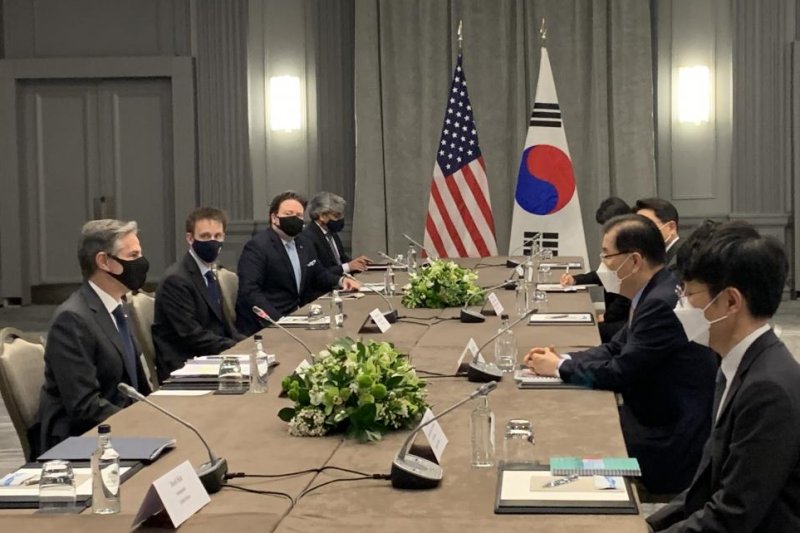1 of 5 | U.S. Secretary of State Antony Blinken called for North Korea to engage diplomatically as he attended a G7 meeting being held in London this week. On Monday, he met with South Korean counterpart Chung Eui-yong (second from right) to discuss regional security issues. Photo by Yonhap
SEOUL, May 4 (UPI) -- U.S. Secretary of State Antony Blinken called on North Korea to return to the negotiating table as he met with counterparts at a Group of Seven meeting for foreign ministers in London this week.
His remarks came after Washington announced that it had concluded its North Korea policy review last week.
"I hope that North Korea will take the opportunity to engage diplomatically and to see if there are ways to move forward toward the objective of complete denuclearization of the Korean Peninsula," Blinken said Monday at a joint press conference with British Foreign Secretary Dominic Raab.
"We'll look to see not only what North Korea says but what it actually does in the coming days and months," he added. "But we have a very clear policy that centers on diplomacy and it is up to North Korea to decide whether it wants to engage or not on that basis."
Blinken said that the new policy takes "a practical, calibrated approach" and will "try to make practical progress that increases the security of the United States, our allies and our deployed forces."
Over the weekend, North Korea issued a statement that warned the United States of consequences for what it called its "hostile policy," saying that it would face a "crisis beyond control in the near future."
"The U.S.-claimed 'diplomacy' is a spurious signboard for covering up its hostile acts, and 'deterrence' touted by it is just a means for posing nuclear threats to the DPRK," Pyongyang foreign ministry official Kwon Jong Gun said in a state-run media report. The Democratic People's Republic of Korea is the official name for North Korea.
Washington's nuclear negotiations with Pyongyang have been at a standstill for more than two years, after a February 2019 summit between then-U.S. President Donald Trump and North Korean leader Kim Jong Un ended without an agreement.
North Korea had been seeking concessions such as the easing of international sanctions in exchange for taking steps toward dismantling its nuclear arsenal, while the United States held firm on complete denuclearization first.
Blinken acknowledged Monday that North Korea remains an "incredibly hard problem" and one that "is yet to be solved from administration to administration."
"We wanted to take [into] account that history, to look at what works, what doesn't work, and how we could have an effective policy to advance the goal that we have, which is the complete denuclearization of the Korean Peninsula," he added.
Blinken said that the policy was informed by "very actively consulting with all of the concerned countries, starting with our close allies South Korea and Japan."
Washington's top diplomat held sideline meetings on Monday with his counterparts Chung Eui-Yong of South Korea and Toshimitsu Motegi of Japan. The three are expected to hold trilateral talks on Wednesday, news agency Yonhap reported.
Marcia Fudge
Housing and Urban Development Secretary. White House Press Secretary Jen Psaki (L) looks on as Secretary of Housing and Urban Development Fudge, the first Black woman to lead the department in decades, speaks at a news conference in the James Brady Press Briefing Room of the White House. Photo by Michael Reynolds/UPI |
License Photo
















